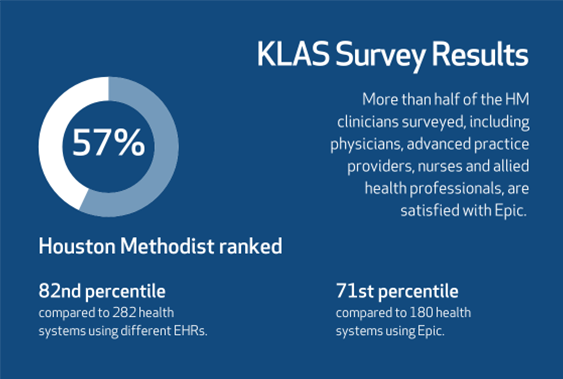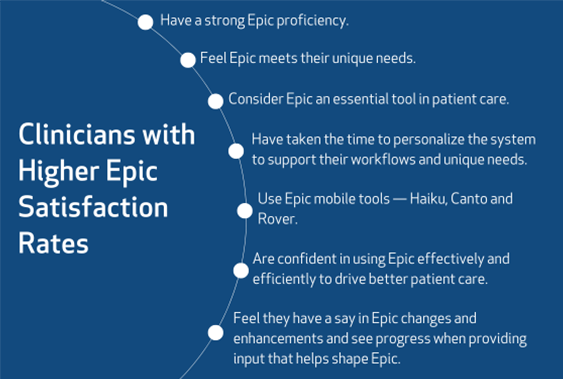First in KLAS: HM’s First KLAS Survey Results Are In, See How We Scored and What We’re Doing to Improve
In November, Houston Methodist participated in the KLAS Arch Collaborative survey for the first time, allowing our providers and nurses to provide feedback on their overall Epic experience. The results are in! While the data shows our electronic health record (EHR) experience is strong, it’s also giving HM leaders valuable insights into Epic’s key strengths, as well as opportunities to improve. This vital information is driving a strong action plan to support our clinicians and ensure they’re using Epic effectively, so they can concentrate on what’s most important to them — caring for their patients.
KLAS survey data overview
KLAS uses standardized surveys to gather honest, impartial feedback from frontline providers and nurses, with real-world experiences. Since 2017, KLAS has partnered with almost 300 health care systems and surveyed over 340,000 clinicians to gauge their EHR experiences and uncover what factors contribute to some clinicians having a better experience than others. KLAS compiles this data to create benchmarks, so health organizations, like HM, can see how we measure up to other organizations, identify opportunities for change and take actions to enhance our clinicians’ EHR experiences.
The results are in!
“Houston Methodist achieving such strong overall EHR experience scores, across all clinical roles, among this benchmark of almost 300 health systems is a great accomplishment,” said Dr. Jordan Dale, HM chief medical information officer.



“Our chief nursing informatics officer, Lisa Stephenson, and I will focus on promoting areas the survey identified as our strengths, while addressing key opportunities to improve our physicians’, nurses’ and other clinicians’ experience with Epic and IT and also improve how IT supports our clinicians’ use and design of Epic and other clinical IT tools.”
High Epic satisfaction rates: The common denominators
While many clinicians are highly satisfied with Epic and value it as a key tool in patient care, there are still those who feel Epic can be a challenge. The KLAS survey identified common factors that contributed to clinicians having higher Epic satisfaction rates, compared to their colleagues who reported lower Epic satisfaction experience scores.
High Epic satisfaction rates: The steps we’re taking to improve
“Houston Methodist clinicians’ feedback is extremely important to us, and we’re taking these results seriously to focus on our strategy moving forward,” said Dr. Dale. “We hear you and have already begun implementing action items to improve the Epic experience for both physicians and nurses, in response to the KLAS survey data.”

First steps include helping clinicians develop a strong Epic proficiency and to improve personalizing the EHR to meet each user’s unique needs. HM leaders are also working to ensure clinicians have a voice through improved enhancement request processes and system governance.
Also on the list, is addressing efficiency roadblocks and those related to recent changes, such as improving documentation efficiency and addressing the recent results review change. They’re also partnering with Epic for new IT training models and working on opportunities to adopt other best practices to help minimize disruptions and improve efficiency.
Finally, leaders are actively partnering with internal IT teams on ways they can improve providers’ and nurses’ experiences with things like downtimes and planned changes, including ways to help minimize downtime interruptions.
“The KLAS data affirms what we’re doing well but also where we have specific opportunities for improvement,” said Lisa Stephenson, HM chief nursing informatics officer. “By continuing to obtain and share this data, we can see how changes we make are impacting clinician satisfaction with the EHR, with the ultimate goal of delivering a tool that enables unparalleled patient care.”
Look for more details on HM’s KLAS Arch Collaborative survey results, including detailed provider and nursing survey results and action plans, in future editions of Physician Connect, Digital Digest and IT Matters.
